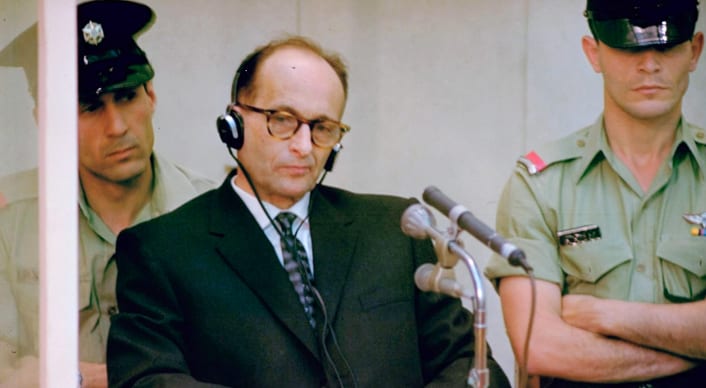Trial of Adolf Eichmann begins in Jerusalem - 11 April 1961
The Nuremberg Trials of Nazi war criminals had ended with the convictions of twelve of the leading accused. However, the indictments had covered many types of war crime. Many leading Nazis had escaped justice by finding refuge in parts of Europe, the Middle East or Latin America. The advent of the Cold War facilitated this process, since the decision of the western Allies to recruit ex-Nazis to bolster anti-Soviet forces in post-war Europe meant a blind eye was often turned to their war crimes. Meanwhile, the Soviet Union categorised all victims of the Nazis together as ‘victims of fascism’ and downplayed the fact that Europe’s Jews had uniquely been singled out for total extermination and that only military defeat had prevented the genocide being carried to completion.

After the end of the war, Eichmann escaped from US military detention and lay low in Germany for some years. In 1950, with the aid of the network of sympathisers that had helped thousands of Nazis to flee from Europe, he obtained a falsified Red Cross ‘displaced persons’ passport and a visa for Argentina. When rumours of his presence there became credible in the late ’50s, Israeli prime minister David Ben Gurion was determined that he should stand trial. In May 1960 a Mossad team was sent to Buenos Aires which kidnapped him near his home and smuggled him on board an El Al flight to Israel.
At his trial before three Israeli judges, Eichmann was charged on 15 counts, including eight of crimes against the Jewish people and four of crimes against humanity against non-Jews. He claimed that he had been a minor cog in a large machine, that he had nothing personally against Jews and that he had never killed anybody.
But witnesses testified to the cold zeal with which he had implemented his programme, impatient at obstacles and loopholes and insistent that not a single Jew be exempted from deportation. When Hungary was invaded, he had become well known for personally supervising the deportation of almost half-a-million Jews to Auschwitz and even ignored his superior Himmler’s orders in late 1944 that the transports and gassings be stopped.
After a 56-day trial attended by hundreds of journalists, he was found guilty on all counts and was executed by hanging in May 1962. His ashes were scattered in the Mediterranean outside Israel’s territorial waters.
Eichmann’s trial set off a debate about the nature of evil that has lasted to this day. Reporting on it for the New Yorker was an American Jewish political philosopher, Hannah Arendt, who coined the phrase ‘the banality of evil’ based on Eichmann’s seeming ordinariness and low-key demeanour in court. This did not sit well with testimony that he had stated ‘I will leap into my grave laughing because the feeling that I have five million enemies of the Reich on my conscience is for me a source of extraordinary satisfaction’. He later confirmed to the judges that by ‘enemies’ he meant the Jews.
Recent portrayals, such as that in the 2018 movie Operation Finale starring Ben Kingsley and Lior Raz, have painted a different image that may be even further from the truth: philosophical, humorous, almost charismatic – the embodiment of what historian Martin Kramer calls ‘the affability of evil’.
Whatever the truth about Eichmann’s personality, his trial succeeded in its goal of placing the Holocaust in the centre of the historical stage and spurring the development of Holocaust education with its twin messages of ‘Never Forget’ and ‘Never Again’.
Neal Bascomb: Hunting Eichmann: How a Band of Survivors and a Young Spy Agency Chased Down the World’s Most Notorious Nazi (2010).
Operation Finale: 2018 movie starring Ben Kingsley & Lior Raz
Martin Kramer: ‘The Truth of the Capture of Adolf Eichmann’, Mosaic Magazine (June 2020).
by Dermot Meleady




